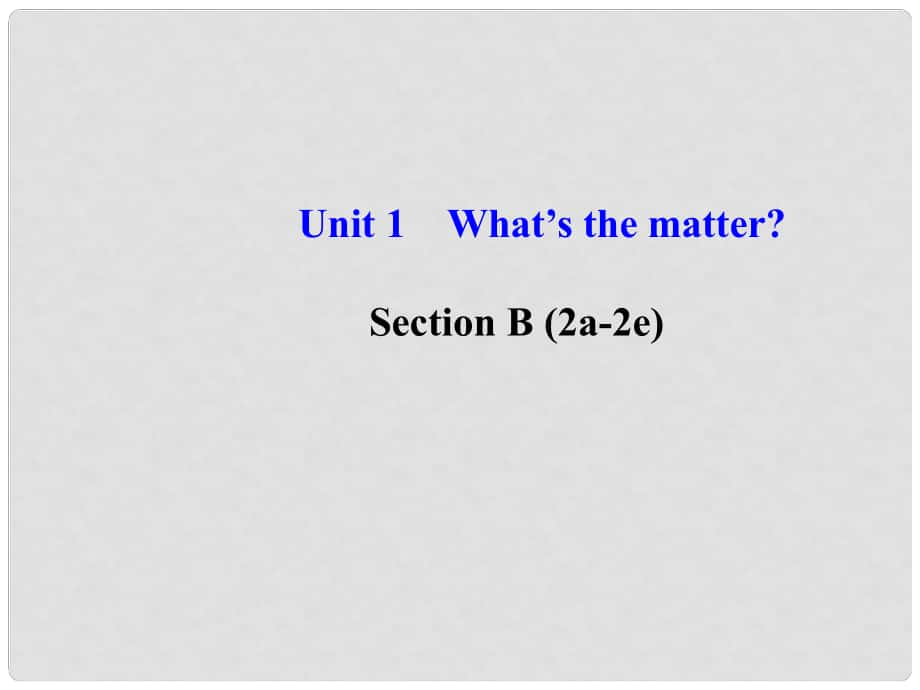《八年級英語下冊 Unit 1 What’s the matter Section B (2a2e)課件 (新版)人教新目標版》由會員分享��,可在線閱讀�����,更多相關《八年級英語下冊 Unit 1 What’s the matter Section B (2a2e)課件 (新版)人教新目標版(24頁珍藏版)》請在裝配圖網(wǎng)上搜索�����。
1��、 Unit 1Whats the matter? Section B (2a-2e) . 短語互譯短語互譯1. 曬傷曬傷 get 2. 呼吸困難呼吸困難 have problems 3. 習慣于習慣于; 適應于適應于 be 4. 用盡用盡; 耗盡耗盡 (of)5. 掌管掌管; 管理管理 be of答案答案: 1. sunburned2. breathing3. used to4. run out5. in control6. take risks(take a risk) 7. cut off 8. get out of 9. keep on(doing sth. ) 10. give up
2���、答案答案: 6. 冒險冒險7. 切除切除8. 離開離開; 從從出來出來9. 繼續(xù)或堅持繼續(xù)或堅持(做某事做某事)10. 放棄放棄. 根據(jù)短文內(nèi)容根據(jù)短文內(nèi)容, 簡要回答下列問題簡要回答下列問題1. What sport is Aron Ralston interested in? 2. What happened to Aron Ralston on April 26, 2003 when he was climbing by himself in the mountains? 答案答案: 1. Mountain climbing. 2. Arons arm was caught under
3、a 360-kilo rock that fell on him. 3. How long did he stay there before he climbed down the mountain to find help? 4. What did he do to save his own life? 答案答案: 3. Five days. 4. He used his knife to cut off half his right arm, bandaged himself with his left arm and climbed down the mountain to find h
4���、elp. 5. What book did he write after losing his arm? 答案答案: A book called Between a Rock and a Hard Place. 1. As a mountain climber, Aron is used to taking risks. 作為一名登山者作為一名登山者, 阿倫習慣于冒險��。阿倫習慣于冒險��?��!咀灾黝I悟自主領悟】be used to意為意為“習慣于習慣于; 適應于適應于”, 其中其中to是介詞是介詞, 后后跟名詞����、代詞或跟名詞�����、代詞或 _形式�。例如形式。例如: He is used to taking
5���、 cold showers even in winter. 他習慣了甚至在冬天也用冷水淋浴��。他習慣了甚至在冬天也用冷水淋浴���。動詞動詞-ing【歸納拓展歸納拓展】used相關短語的用法相關短語的用法 be used to sth. /doing sth. 意為意為“習慣于習慣于”, 相當于短語相當于短語get used to。例如例如: Be patient and you will be used to the life here soon. 耐心些耐心些! 很快你就會習慣這兒很快你就會習慣這兒的生活的��。的生活的�。be used to do sth. (=be used for doing s
6、th. )意為意為“被用來做某事被用來做某事”, 是動詞是動詞use的被動結(jié)的被動結(jié)構(gòu)�����。例如構(gòu)。例如: Plastics can be used to make all kinds of things. 塑料能被用來制造各種各樣塑料能被用來制造各種各樣的東西�。的東西。used to do sth. 意為意為“過去常做某事過去常做某事”, 表達過去�����。例如表達過去�����。例如: I used to go to the cinema, but I hardly ever have time for films now. 我過去經(jīng)常去看電影我過去經(jīng)常去看電影, 但現(xiàn)在我?guī)缀鯖]有時間看電影了��。但現(xiàn)在我?guī)缀鯖]有
7��、時間看電影了�。【活學活用活學活用】 我媽媽習慣于早上早起�。我媽媽習慣于早上早起�。My mother up early in the morning. 他過去常騎自行車去上班他過去常騎自行車去上班, 但現(xiàn)在他乘地鐵但現(xiàn)在他乘地鐵(去上班去上班)。He his bike to work, but now he takes the subway. 答案答案: is used to gettingused to ride刀子是被用來切割東西的���。刀子是被用來切割東西的����。Knives are things. 答案答案:used to cut/used for cutting2. But when his
8、water ran out, he knew that he would have to do something to save his own life. 但是當他的水用盡時但是當他的水用盡時, 他知他知道他必須做一些事情來拯救自己的生命����。道他必須做一些事情來拯救自己的生命?!咀灾黝I悟自主領悟】run out作不及物動詞短語作不及物動詞短語, 意為意為“用盡用盡; 耗盡耗盡”, 主語通常是時間、金錢�����、水�����、食物等無生命名詞�����。主語通常是時間���、金錢���、水、食物等無生命名詞。例如例如: His strength ran out. 他的力氣用完了���。他的力氣用完了���。【歸納拓展歸納拓展】run out o
9��、f的用法的用法 run out of意為意為“用完用完; 用盡用盡”, 是及物動詞短語是及物動詞短語, 表示表示主動主動, 主語是人主語是人, 后接后接_作賓語�����。例如作賓語���。例如: They have run out of money. 他們已經(jīng)把錢花完了��。他們已經(jīng)把錢花完了���。名詞或代詞名詞或代詞【活學活用活學活用】 當食物耗盡時當食物耗盡時, 他們不得不外出尋找能吃的東西。他們不得不外出尋找能吃的東西����。When the food , they had to go out to find something to eat. 當你們的測試時間結(jié)束時當你們的測試時間結(jié)束時, 你們必須立刻交卷��。你們
10、必須立刻交卷�。When you your test time, you have to hand in your test papers at once. 答案答案: ran outrun out of3. His love for mountain climbing is so great that he kept on climbing mountains even after this experience. 他對登山的熱他對登山的熱愛是如此深厚以至于在這次經(jīng)歷之后他還繼續(xù)登山。愛是如此深厚以至于在這次經(jīng)歷之后他還繼續(xù)登山�����?!咀灾黝I悟自主領悟】(1)“so+形容詞形容詞/副詞副詞+tha
11、t從句從句”意為意為“如此如此以以至于至于”, 引導結(jié)果狀語從句��。例如引導結(jié)果狀語從句�����。例如: The math problem is so difficult that I cant work it out. 這道數(shù)學題是如此難以至于這道數(shù)學題是如此難以至于我解不出來����。我解不出來。(2)keep on _ sth. 意為意為“繼續(xù)或堅持做某事繼續(xù)或堅持做某事”, 常表示將一常表示將一直在做的事繼續(xù)做下去��。例如直在做的事繼續(xù)做下去�����。例如: They kept on working though it was dark. 盡管天黑了盡管天黑了, 他們卻繼續(xù)工作��。他們卻繼續(xù)工作。doing【用法辨
12��、析用法辨析】such. . . that/so. . . that的區(qū)別的區(qū)別such. . . that/so. . . that意為意為“如此如此以至于以至于”, 用來引導結(jié)果狀語從句�。其具體結(jié)構(gòu)如下用來引導結(jié)果狀語從句。其具體結(jié)構(gòu)如下: adj./adv.adj.+a/an+_many/few+可數(shù)名詞復數(shù)可數(shù)名詞復數(shù)much/little+_(1)so+單數(shù)名詞單數(shù)名詞不可數(shù)名詞不可數(shù)名詞+that從句從句a/an+adj.+單數(shù)名詞單數(shù)名詞adj.+_adj.+復數(shù)名詞復數(shù)名詞(2)such+不可數(shù)名詞不可數(shù)名詞+that從句從句【活學活用活學活用】 那次聚會是如此讓人激動以至于我永
13����、遠都不會忘記它。那次聚會是如此讓人激動以至于我永遠都不會忘記它�。The party was I would never forget it. 她是如此好的一位老師以至于所有的學生都喜歡她。她是如此好的一位老師以至于所有的學生都喜歡她����。She is good teacherall the students like her. 答案答案: so exciting thatsuch a; that昨天我們堅持學習到深夜。昨天我們堅持學習到深夜�����。We late into the night yesterday.答案答案: kept on studying . 用所給詞的適當形式填空用所給詞的適當形式填
14���、空1. Whats wrong with the baby? He has problems(breathe). We must take him to the hospital at once. 2. If you stay outside in the sun in summer for too long, maybe youll get(sunburn). 答案答案: 1. breathing2. sunburned3. Everyone must realize the(important) of his life. 4. Losing a bus in London means(wa
15���、it) for another hour. 5. Her pet dogs(dead) made her feel very sad. 答案答案: 3. importance4. waiting5. death. 完成句子完成句子1. 爬山是危險的爬山是危險的, 但是杰克不介意冒險。但是杰克不介意冒險���。Mountain climbing is dangerous. But Jack doesnt mind . 2. 湯姆習慣于自己照顧自己�。湯姆習慣于自己照顧自己����。Tom is himself. 答案答案: 1. taking risks2. used to looking after3. 吉米在離家還有一英里的地方把汽油用完了。吉米在離家還有一英里的地方把汽油用完了��。Jimmy gas a mile from home. 4. 我們應該學會管理時間���。我們應該學會管理時間�。We should learn to time. 答案答案: 3. ran out of4. be in control of5. 不要放棄不要放棄! 繼續(xù)嘗試直到成功���。繼續(xù)嘗試直到成功���。Dont ! Just trying until you succeed. 答案答案: give up; keep on
 八年級英語下冊 Unit 1 What’s the matter Section B (2a2e)課件 (新版)人教新目標版
八年級英語下冊 Unit 1 What’s the matter Section B (2a2e)課件 (新版)人教新目標版

